The long journey to Paris stretched out before him. Benjamin Franklin sat quietly in the carriage looking outside at the dawn of the sun. It was quiet and birds could be heard chirping and locals in the area could be seen outside doing yardwork and attending to farm animals. John Jay and John Adams accompanied Franklin on his journey. Jay and Adams had a stern relationship and could never really see eye to eye with each other’s way of thinking. The silence inside the carriage was loud with only the sound of wheels clicking against the cobblestone road and horse hooves clanking with every step. Benjamin couldn’t believe how far he had come. The country’s fate was at stake and he could only imagine the many possible outcomes.1 John Jay finally broke the silence, “We’re nearly there” as he looked outside the window. John Adams, who was half asleep, began to sit up from his seat. Up ahead lay the beautiful city of Paris. The city stood out proudly and gave a strong sensation of goosebumps down Benjamin’s arms.
The driver parked at a nearby building. The driver likely said something along the lines of “Have a good day, gentlemen; please take any belongings with you.” Benjamin grabbed his bag and put on his coat and glasses, likely telling the men, “Alright gentlemen, the court should be just down this block.” Jay and Adams, likely discussing Franklin’s plan, began to follow closely behind him. It was chilly outside, but the men stayed close together in the busy streets of Paris. People were beginning to wake up, so the streets were already packed with vendors, pedestrians, and stores opening up. Benjamin knew that he was going to face the minister of foreign affairs, but the stress of it didn’t reach him until he overheard Jay and Adams talking about it behind him. They were very likely concerned about Franklin’s approach to his negotiation, and they worried that he might say the wrong thing. Adams was possibly in agreement, but he was more concerned about fishing rights for the U.S.2 Benjamin had already begun to feel the stress and frustration set in, so he probably turned around and silenced the men. Benjamin could have very well scolded the two men for their conversations, but he knew he was the right man the country needed the most.
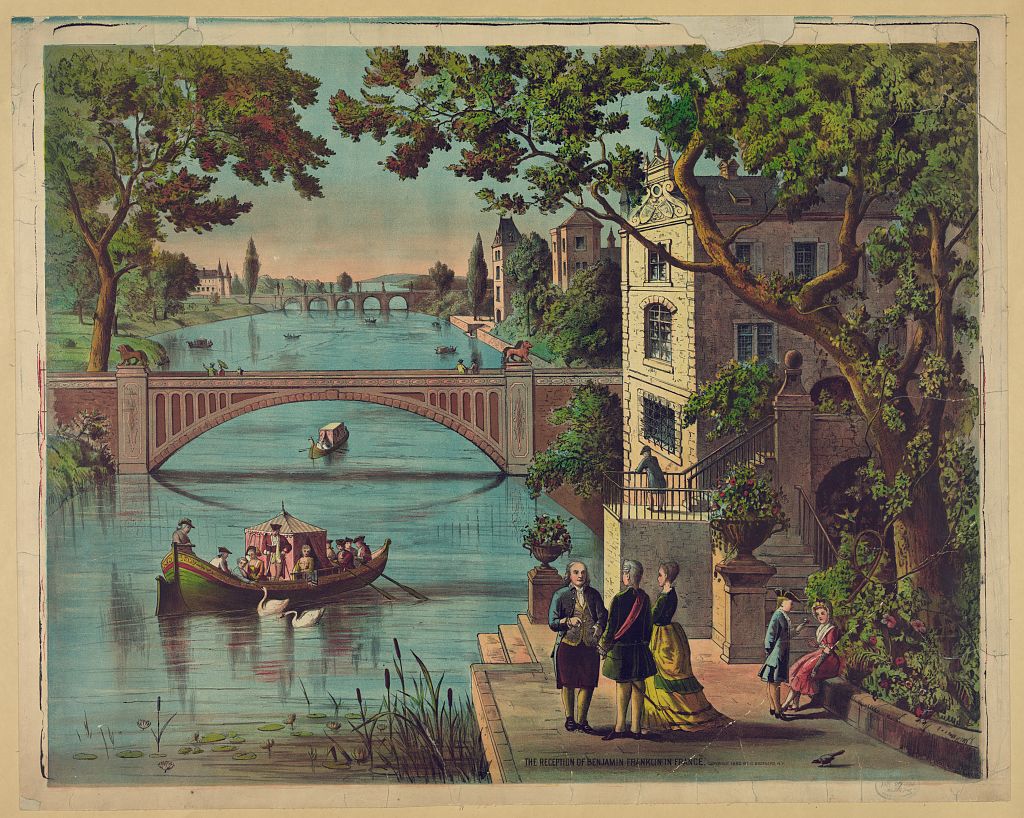
They neared the court and walked up the stairs entering the large brown oak doors that stood tall before them. They met inside where the minister was already waiting. Benjamin’s reputation and legacy were very well known across the country of France. So it was no surprise the minister knew of his time there in France, especially with his growing connection to their culture.3 Benjamin was always a charming man and he probably told the minister, “Oh why thank you sir. It is an honor to be here. I hope I didn’t keep you waiting too long. The weather out there feels like the one back home,” he chuckled. The minister knew that Franklin was here to discuss important business, so he wasted no time to dive into the situation. John Jay and John Adams followed Franklin and sat beside him in the court. Several other officials were there guarding the side lines of the room. The minister sat on a fairly tall chair and pulled up a brown wooden podium. The tables where the three men were sitting were very well polished and neatly cleaned. It looked as if it had never been used before. Benjamin wanted France to further aid America in its war for independence, and he knew that to get on people’s good side, he would have to maintain his charming attitude even in debate.4 The minister was stunned for a moment, not sure what to say. He looked almost annoyed a little and probably put his hand on his forehead. “Mr. Franklin, I’m afraid I can not do that. I would like to, but we are already dealing with territorial ambitions and I really don’t want to direct more of our resources to your cause. We are trying to limit British power in our region, especially in the Caribbean and Canada. I can suggest that you can help us and maybe that can work out in your favor somehow,” he likely told him. Benjamin Franklin knew this could happen, but stayed just as charming as when he entered. John Jay, listening to this go down, started to distrust the French and believed they were not their allies. Franklin probably responded with an understanding tone; however, he did mention meeting with the British delegation and David Hartley. The men got up to leave, but not before they probably saw worried looks on the people in the room.
Days passed and the men had now traveled to Britain and were meeting in a grand salon. Since they would be meeting with a royal official, there’s a good chance the furniture was very royal, and much of the place would have consisted of a red-on-yellow theme. They sat down in fancy red chairs with David Hartley and other men in the room. While conversing with Hartley, Benjamin Franklin realized that Hartley refused to recognize America’s independence. He stated that it was crucial Britain maintain territorial control and trade ties and was reluctant to give it up.5 Adams, who would likely feel frustrated, would probably whisper to Benjamin, “You’re being too soft with them sir. All we’re doing is wasting time! You need to be more aggressive!” Benjamin could understand where Adams was coming from, but he knew this was not the answer.6 Franklin remained calm. He wanted to end on good terms, so he offered that they meet again soon. Benjamin was definitely frustrated deep down, but he knew that he had to contain a charming attitude if he wanted talks to go in his favor. Franklin and the two men would likely head to a nearby hotel to spend their days. John Jay and John Adams would probably be arguing with each other almost every other night about what they or Benjamin should do. He always wondered what he should do, and is at a point where it all just felt pointless. Maybe Adams was right, but Franklin definitely believed that there was still hope.
More time went by and Franklin received a message from a Spanish diplomat. He said he wished to meet with Franklin regarding territorial claims in Florida and the Mississippi River. Franklin would likely go alone to Spain and leave the two men to look after the hotel. Franklin arrived in Spain in a couple of weeks and met up with the Spanish. The Spanish were demanding concessions from America in exchange for supporting their push for independence. Franklin knew Spain was a powerful country and knew he could not afford to give up too much territory to the Spanish, especially since America was expanding westward; however, he knew rejecting could weaken their negotiating position.7 Franklin returned back to the hotel and told Adams and Jay about the meeting. “You can’t appease Spain Franklin! This could create long-term sovereignty in the West!” exclaimed John Jay as he likely would say since, he was deeply frustrated. Franklin, already likely filled with stress about the negotiations, would have even more stress added on. Benjamin went to sleep that night probably worried about what would happen next. For one man, this was a lot of responsibilities with a high-risk high-reward on the line. Then he thought of something brilliant, but the consequences would be huge!
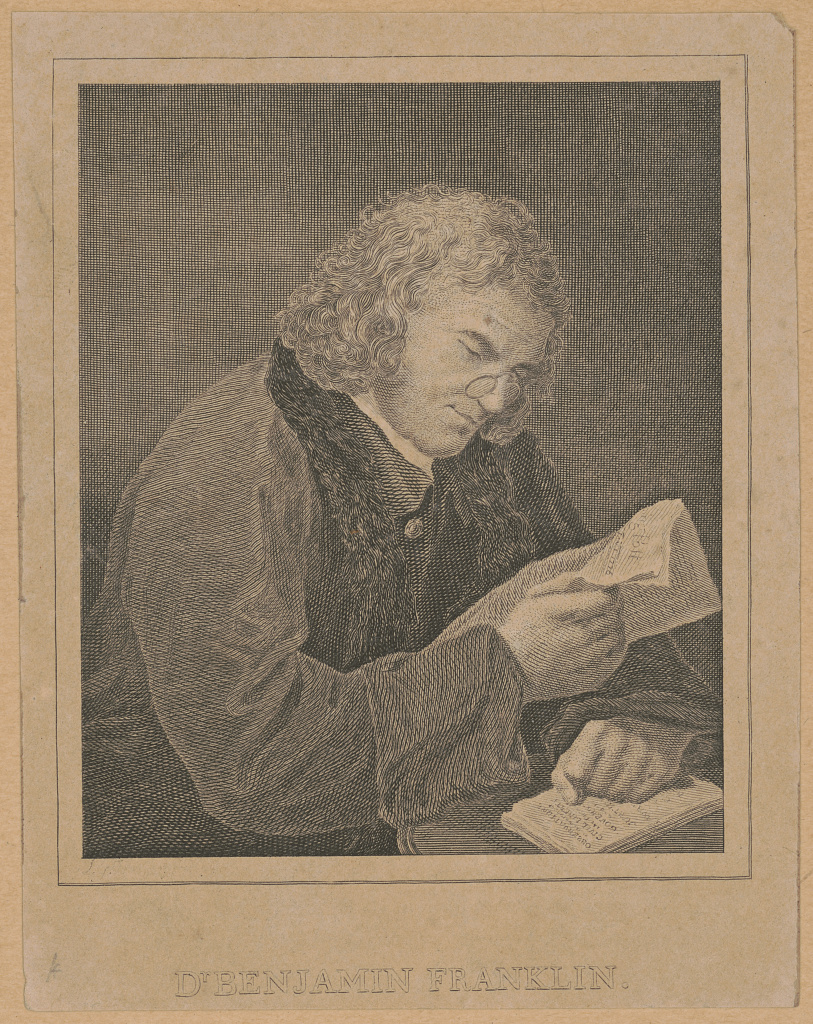
Late one night, Franklin likely snuck out of the hotel and met with British negotiators privately without telling the French or Jay and Adams about it.8 This could be seen as a huge betrayal against the French but it was a risk he was willing to take. Franklin presented a softer idea of his negotiations with the British in hopes of them favoring it. Franklin was risking his alliance with France, and who knows what would happen if they found out. It would be a huge Fallout and it could be the end of America as they knew it! The morning rolls around, and John Jay and John Adams learned of the meeting and were furious. They would likely argue with Franklin and scold him on how his actions could jeopardize their connection with France. The room grew loud with anger and John Jay and John Adams left the hotel for the day. Later that evening, Franklin was probably at his desk with many papers out in front of him. The negotiation deadlines were nearing and the pressure was on. All these pressures: Britain refusing to recognize independence, while France pressuring America to follow its lead, all while Spain continued to threaten westward expansion. Franklin would probably feel the urge to breakdown and let a tear fall from his eye. He had probably never been so stressed in his life and he felt there was just no hope for him. He would consider giving up, but he knew one thing: whatever he did would determine the fate of the country.
September 3rd was the final showdown between these forces. He, Jay, and Adams, along with French and British officials, including David Hartley, gathered at the Hôtel d’York in Paris. They all sat down. Franklin remained calm and began to speak. As the debate continued, Franklin became worried about French suspicion, knowing that if they found out about his secret meeting, then it would over. The suspense in the room grew larger with every passing minute. Adams believed the time for compromise was over, while Jay was resisting getting involved in the talks. Franklin looked at Adams who was frustrated, and then at Jay who nodded that they must continue. Franklin carefully crafted his argument and offered small concessions while making it clear that full independence is non-negotiable.9 The British exchanged glances as the war had drained their resources and Franklin noticed that they were starting to soften. Adams almost jeopardized the talks by demanding that the British relinquish all claims to certain territories, however Franklin stopped him. After what felt like hours upon hours of non-stop talking, the British recognized American independence under a few terms and while it wasn’t a perfect deal, it would be enough for Franklin. At last, after a sigh of relief, the Treaty of Paris was signed. Benjamin, John Jay, and John Adams had done what was thought to be impossible.
Later that day, the men probably boarded a ship for America and celebrated with a cup of tea. “Cheers gentlemen?” asked Franklin. The men laughed and talked all the way home. The people back home already received the news and were crowded at the dock. The boat reached shore and people were cheering and clapping as the men walked off the boat. Franklin couldn’t believe it. All the hard work and sleepless nights had finally paid off. Jay likely whispered to Franklin about what he planned to do about Spain.10 Franklin glared at him.
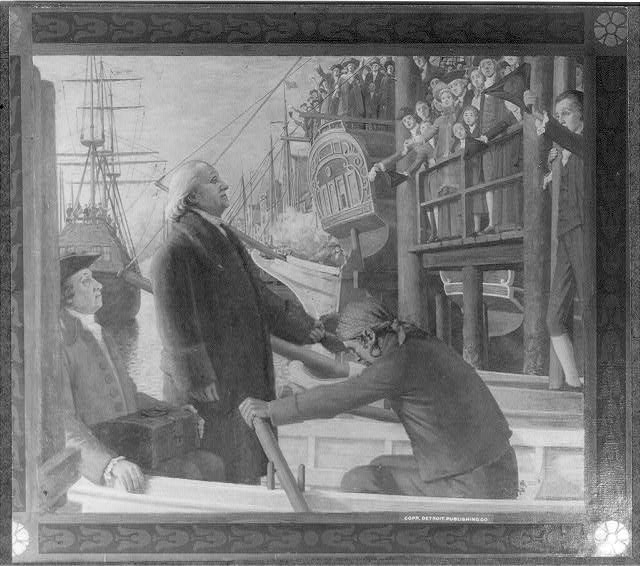
- Jennifer Stock, ed., “Treaty of Paris (Excerpt),” in American Eras: Primary Sources, vol. 6, The Revolutionary Era, 1754?1783 (Farmington Hills, MI: Gale, 2015), 239–42. ↵
- Jennifer Stock, ed., “Treaty of Paris (Excerpt),” in American Eras: Primary Sources, vol. 6, The Revolutionary Era, 1754?1783 (Farmington Hills, MI: Gale, 2015), 239–42. ↵
- Claude-Anne Lopez, My Life with Benjamin Franklin (NEW HAVEN; LONDON: Yale University Press, 2000), 170. ↵
- Stephan A. Schwartz, “Dr. Franklin’s Plan,” Smithsonian (Smithsonian Institution, June 1, 2001), Gale in Context: College. ↵
- Jennifer Stock, ed., “Treaty of Paris (Excerpt),” in American Eras: Primary Sources, vol. 6, The Revolutionary Era, 1754?1783 (Farmington Hills, MI: Gale, 2015), 239–42. ↵
- Edwin S. Gaustad, “Benjamin Franklin : Inventing America / Edwin S. Gaustad.,” January 1, 2004, 110-111. ↵
- Jennifer Stock, ed., “Treaty of Paris (Excerpt),” in American Eras: Primary Sources, vol. 6, The Revolutionary Era, 1754?1783 (Farmington Hills, MI: Gale, 2015), 239–42. ↵
- Stephan A. Schwartz, “Dr. Franklin’s Plan,” Smithsonian (Smithsonian Institution, June 1, 2001), Gale in Context: College. ↵
- Stephan A. Schwartz, “Dr. Franklin’s Plan,” Smithsonian (Smithsonian Institution, June 1, 2001), Gale in Context: College. ↵
- Edwin S. Gaustad, “Benjamin Franklin : Inventing America / Edwin S. Gaustad.,” January 1, 2004. ↵
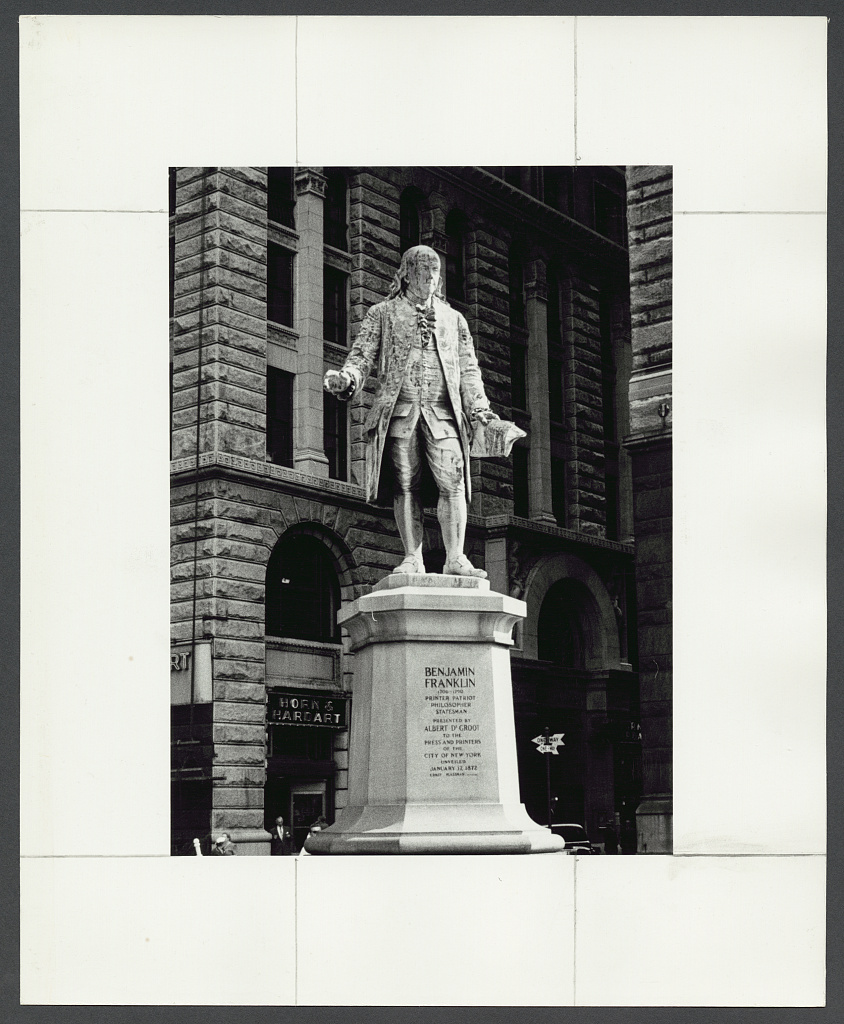

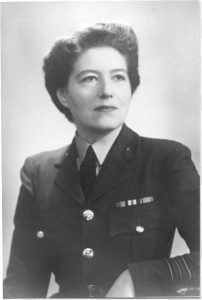

7 comments
arosales11
I’m intrigued by the utilization of point of view. You present intriguing shifting viewpoints from Benjamin Franklin, John Adams, and John Jay. This infographic intrigues me since it discusses what students do not learn in high school. That figures like Benjamin Franklin and General Lafayette were critical to the American Revolution. I suppose the tone is rather theatrical.
Macarena Machado Combe
The article was informative and easy to read because it was written as a story making it more entertaining and flow easily. Something I found engaging was the courage and boldness that Franklin showed all along the text. For example, when Franklin took a significant risk by meeting with the British association privately, without informing the French or his colleagues, John Jay and John Adams. This move demonstrated his strategic thinking and willingness to secure favorable negotiations, but it also demonstrated overconfidence as he took for granted the importance of transparency between colleagues.
Alysia Cano
This narrative wonderfully captures the tension, diplomacy, and complex relationships between Franklin, Jay, Adams, and the foreign powers during the American Revolution. The blend of historical accuracy with imaginative details makes the story both engaging and insightful, offering a fresh perspective on the critical moments leading to the Treaty of Paris.
Danielle Villanueva
What an incredible journey through Benjamin Franklin’s diplomatic negotiations during the American Revolution! I learned how complicated international diplomacy was, with Franklin carefully balancing relationships between France, Britain, and Spain. The story highlights his remarkable patience, charm, and strategic thinking during incredibly high-stakes discussions that would ultimately secure America’s independence.
Emilio Orona
I find quite interesting the use of point of view. You give interesting changing perspectives from Benjamin Franklin, John Adams, and John Jay. This infographic really interests me because it talks what kids don’t learn in high school. That people like Benjamin Franklin and General Lafayette were key for the American Revolution. I do believe the tone is a bit dramatical.
Gannon
What a well written piece of art!
Jeremiah
Came upon this article about Benjamin Franklin and it was really interesting and informative.